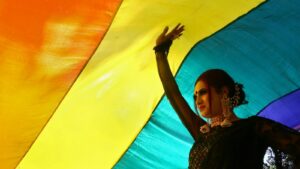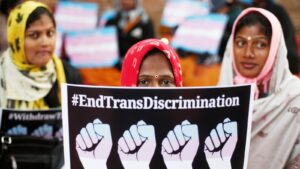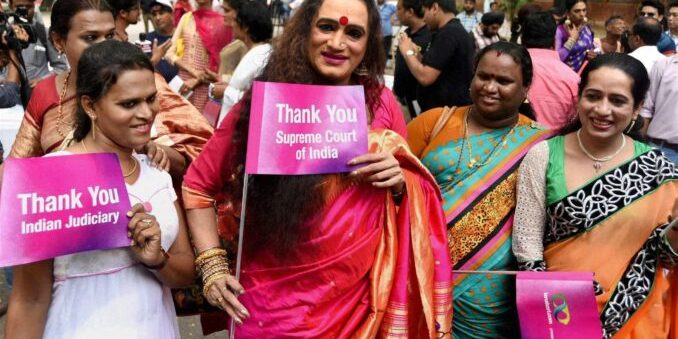TRANSGENDER- A SENSITIVE GLOSSARY
Most of us have never thought much, if at all, about what it might be like to be a transgender, or to have a child who is. It has simply never struck us that there might be mothers who have given birth to a child, yet are not sure whether their baby is a boy or girl; or that there are children who feel, literally, trapped in a body, which, while healthy and perfect, is somehow all wrong. Being a transgender is complicated. They are denied jobs. It doesn’t fit into the boxes we have grown up expecting, those boxes which assign us to preconceived identities, with rules, expectations and boundaries few children dare to cross. We have never considered that, from the moment of birth, a penis or a vagina on a baby decides that child’s fate. Being a transgender is complicated. They are denied jobs.
THE TRANSGENDER PERSONS( RIGHT TO PROTECTION) ACT 2014
The Rights of Transgender Persons Bill, 2014 is a proposed Act of the Parliament of India which seeks to end the discrimination faced by transgender people in India. The Bill was passed by the upper house Rajya Sabah on 24 April 2015.[1] It was introduced in the lower house Lok Sabha on 26 February 2016.
Transgender federal community has criticized many rights and bill introduced by the government in 2016. Law makers also did not find it important to raise the law for the transgender and took them for granted. Being a transgender is complicated as they are denied jobs.
The Transgender Persons (Protection of Rights) Act, 2019 is an act of the Parliament of India with the objective to provide for protection of rights of transgender people, their welfare, and other related matters. The act was introduced in the Lok Sabha, the lower House of the Parliament, on 19 July 2019 by the Minister of Social Justice and Empowerment for the welfare of the transgenders.
 A policy was introduced later which decided that a certificate will be issued in favor of transgender as their identity certificate by the District Magistrate. Then they can apply for the “Change of Gender” certificate on the basis of the medical certificate provided by the hospital of the surgery and can make the corrections needed. This is how they were given place to stay in the society. Further it was decided by the courts that these people should be given identity by the government so that they are treated well in the society.
A policy was introduced later which decided that a certificate will be issued in favor of transgender as their identity certificate by the District Magistrate. Then they can apply for the “Change of Gender” certificate on the basis of the medical certificate provided by the hospital of the surgery and can make the corrections needed. This is how they were given place to stay in the society. Further it was decided by the courts that these people should be given identity by the government so that they are treated well in the society.
When a child is born it is usually endowed with male genitalia or female genitalia. But there are children who are born with a genitalia that belongs to neither category. They are known as intersex children. They must be given the time and space to find their true gender identity,” the judgment reads. The judgement further acknowledged that, “Beyond the man-woman binary, there are as many as 58 gender variants.”
TRANSGENDER IN INDIA
India has about two million transgender people, and in 2014 the country’s Supreme Court ruled that they have equal rights under the law as well as the right to marry and inherit property, they are also eligible for quotas in jobs and educational institutions. Activists say these people live on the fringes of society, often in poverty, ostracized because of their gender identity. Most make a living by singing and dancing or by begging and prostitution to make ends meet, Rights groups say they often face huge discrimination and have been forced to choose either male or female as their gender in most public spheres.
 In India, transgender individuals are marginalized: 96% are denied jobs, and 60% have no access to education. Plus, a new bill from the Indian state gives the government the power to arbitrate which transgender people get to identify as transgender. therefore Being a transgender is complicated as they are denied jobs and access to education.
In India, transgender individuals are marginalized: 96% are denied jobs, and 60% have no access to education. Plus, a new bill from the Indian state gives the government the power to arbitrate which transgender people get to identify as transgender. therefore Being a transgender is complicated as they are denied jobs and access to education.
Even in the hospitals requests by transgender people to be admitted in hospital wards of the gender of their choosing are often ignored, and when they do get admitted, they’re mocked and bullied by their fellow patients and medical staff.
While Indian passports recognize a ‘third gender,’ it is not always helpful in the case of transgender people: trans men are different from trans women, who are different from intersex individuals; a ‘third gender’ also prevents transgender individuals from being identified within the binary system if they so wish.
Recently, a Raipur biology teacher told a classroom full of children that girls should avoid wearing jeans and lipstick because it would “incite crimes like the Nirbhaya gang rape.”
The latest in the recent string of jeans-haters is a Kerala professor who reportedly said that women who wear jeans will “give birth to transgender.”
Activities like rejection in entering public and religious places by transgender was one activity which is supposed to be inhuman in nature and was actually performed by normal humans of the society.. People use to give them unwanted attention by insulting them, abusing them in public places, punishing them for no reason and cursing them out of the society.
The Indian Transgender Persons Act strongly prohibits discrimination on the grounds of gender and renders it illegal, too, but only in the case of government bodies, completely skipping private organizations from its purview. While the Act recognizes intersex individuals, it makes no specific provisions for their protection.
GROWING UP AS A TRANSGENDER
This is the social, legal and cultural context every single gay or transgender child is born into in India; it is their reality, and parents often struggle to insulate them against it. Unconditional support is difficult when parents know their child is different and will be living a different lifestyle to the one expected of them by society. Many parents, worry whether it is possible for a handful of people – perhaps parents only – to provide a Transgender child with enough love and support to outweigh society’s negative messages. Parents of transgender force them to leave the house at the earliest because of what society will say to them when they will keep a transgender boy or a girl with them. It was a complete myth and threat which they face by the society. Is it possible to keep gay and transgender children safe while encouraging them to be true to themselves?
INDIA STEPS TOWARDS GIVING TRANSGENDERS A BETTER TOMORROW
India opened its first transgender school in 2016.A residential school for transgender people has been opened in the Indian city of Kochi, to help adults who dropped out of school finish their education. The school is in Kerala, which is the first Indian state to adopt a transgender policy against discrimination. It promotes inclusive education, and offers free gender reassignment surgery at government hospitals.
The centre’s organisers said they had arranged sponsors for all the students, to pay for their food, accommodation and studies. The teachers also belong to the transgender community – a measure designed to protect and encourage the pupils. The decision comes after India’s first transgender college principal, Manabi Bandopadhyay, resigned from her post claiming that some of her students and fellow teachers had agitated against her because of her sexual identity.
Anannyah Kumari Alex, a 28-year-old transgender woman, is contesting the 2021 Kerala Assembly elections from the Vengara constituency in Malappuram. For the past five to six years, she has been juggling multiple careers as a radio jockey, a busy make-up artist, and an anchor.
The Madurai bench of the Madras High Court upheld the marriage of a man and a trans woman , after they approached the court to complain about registration authorities who refused to acknowledge the trans woman as a bride under the Hindu Marriage Act of 1955.
Justice G R Swaminathan, while issuing a verdict in the case, referred to Article 14 of the Constitution of India, which ensures that all persons in India enjoy equal protection under the law.
The judgement reads, “Transgender persons fall within the expression ‘person’ and hence entitled to legal protection of laws in all spheres of State activity as enjoyed by any other citizen of this country,” Justice Swaminathan said, “gender identity falls within the domain of her personal autonomy and involves her right to privacy and dignity,” and that state authorities have no business questioning the trans woman’s self determination of identity.
While ‘transgender’ has been categorized as a third gender and people identifying as such have been given the right to self-identification after a landmark Supreme court ruling in 2014, cases where their self-identification has been upheld by judicial institutions are few and far between. By acknowledging the trans woman’s identity as a bride, Madras HC upheld the protections accorded by the constitution and showed that it respected her rights to self-identify under the law.
A Noida-based private institute has set up a gender-neutral toilet after its sole transgender student highlighted the problem of choosing between the men’s and women’s bathroom.
India’s first transgender toilet was inaugurated earlier this year in Varanasi with four more coming up at different locations in Uttar-Pradesh.
To conclude, India being a democratic country consists of long road which combines variety of people in it with various problems. Religion, caste is ongoing matter in which India is already struggling and it cannot manage to afford Gender as another problem. Although this problem is already in motion and acquired a long way in the country. A nationwide campaign should be arranged among the people to create a scope of awareness for these people and acceptance. People should open their hearts and mind to accept these beautiful creations as humans in the world.
Authored by: Radhika Budhiraja








